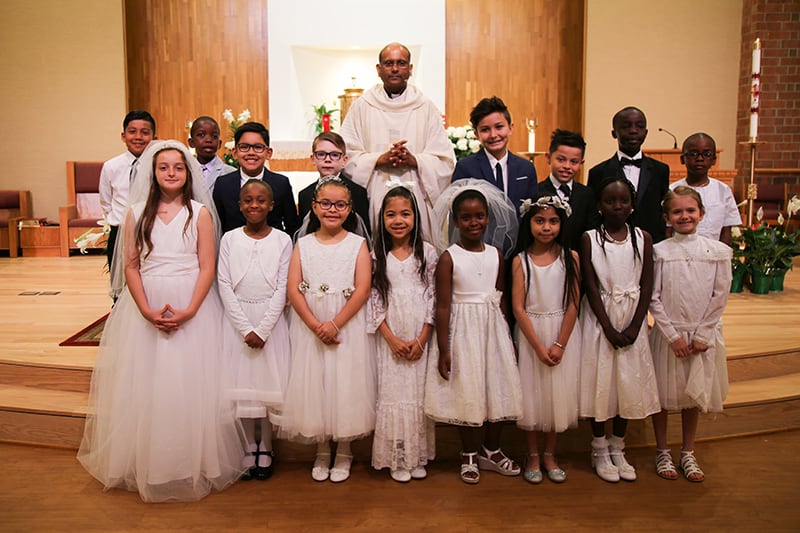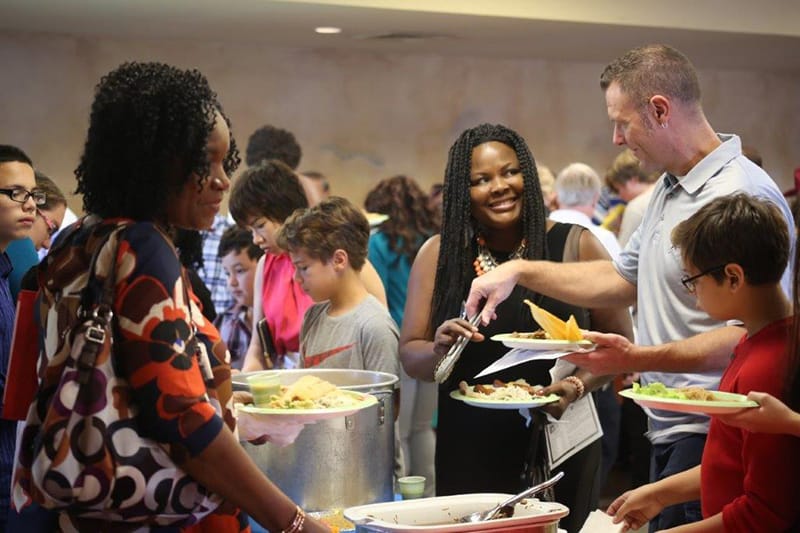
U.S. Catholics lead all Christian faiths in the percentage of racially diverse congregations in their parishes, according to a new study published by Baylor University.
St. Ignatius of Antioch Parish perfectly embodies that diversity in the American Catholic Church and in the Diocese of Nashville.
“We welcome everybody,” said St. Ignatius pastor Father Titus Augustine. “We all respect each other.”
Father Augustine, who is originally from India, estimates there are 33 countries and cultures represented in the parish, with parishioners from Nigeria, Mexico, Peru, Vietnam, Germany, and a number of other countries.
“Catholic churches on average continue to be more diverse than Protestant churches with 23 percent multiracial, up from 17 percent” in 1998, when churches were first surveyed, the Baylor study said.
The reason: “largely white congregations that are gaining more color,” the study’s author, Kevin Dougherty, an associate professor of sociology at Baylor University in Waco, Texas, said in a Nov. 13 phone interview with Catholic News Service.
“As the American neighborhood has become more racially mixed, the Catholic churches that serve those neighborhoods as a byproduct have taken on more diversity much more quickly than Protestant churches do,” Dougherty said.
This is true of the Antioch neighborhood where St. Ignatius has served the faithful since 1976. In recent years, the area has become one of the most diverse areas of Davidson County, according to the latest U.S. Census data.
“I’ve lived different places around the world and St. Ignatius is an amazing cultural and spiritual environment,” said St. Ignatius parishioner and parish council member Steve Ortiz.
“It’s one thing to have different cultures, but the interaction we have at St. Ignatius is truly a blended medley of these cultures,” Ortiz said.
Parishioners from dozens of different countries worship together at St. Ignatius every Sunday, and over 100 children learn together through the parish’s religious education program. One of the biggest events of the year, the parish family picnic, is centered around celebrating the many cultures represented in the parish through sharing food and entertainment.
Having a diverse mix of voices in parish leadership roles is also important, said Father Augustine. “In my parish council I try to fill it with people from different countries,” he said. “We are a true church family.”
For parishioners like Ortiz, St. Ignatius has become a spiritual family. “My own upbringing was founded in a very rich multi-cultural Catholic family,” he said, “deeply rooted in both Hispanic and European heritages (where Spanish and German were both spoken) with a wonderful spiritual foundation.
“Reflecting on St. Ignatius, my spiritual family, it is very much the same as my biological family, with a common and deep Catholic faith spoken in many languages,” Ortiz wrote via email.
That word “family” comes up over and over again when St. Ignatius parishioners describe their church home. “We are just like a family,” said parish council member and usher Chike Oramah, who is originally from Nigeria and has lived in Middle Tennessee since 2012. “We appreciate each other,” he said.
Before the pandemic put a major damper on social gatherings and interactions, “people would hang around after church, they didn’t clear out immediately,” Oramah said. “If you visit St. Ignatius you will see this really is a place for all.”
During COVID, St. Ignatius has been and is committed to keeping parishioners together even though they may not always be meeting in person. “We stream our Sunday Masses and have many Zoom meetings throughout the week,” said Ortiz. “We don’t want to, and will not, let that connectivity go.”
Parishioners from around the world were complimentary of how Father Augustine ministers to them. “It’s not really a big challenge,” he said. “There is unity in diversity.”
“We really like the people and Father Titus. He and the congregation make us all feel welcomed and a part of the church community,” said Long and Thao Truong, originally from Vietnam. They and their children Rachael and Andrew have been a part of St. Ignatius for the past 12 years. “The people are beautiful and we feel loved at St. Ignatius,” they said.
Catholics may benefit from greater diversity because the faith is worldwide, said Baylor study author Dougherty. “The Roman Catholic Church is a global denomination. There are Catholic members in Southeast Asia and Latin America and Europe, and their immigrants to the United States are bearing that religion with them and they try to find a faith community that matches their own tradition.”

Dougherty told CNS, “From prior research that I’ve done or that others have done, the reason that people join a multiracial congregation, is a desire for diversity. There is something appealing about that.”
Clergy may push their parishioners to be more diverse, but “the most successful long-term embrace of diversity is when it’s organically claimed by the congregation on the part of the laity,” he said. “Otherwise, it just becomes a failed initiative from the top.”
Parishioners like Ortiz, who doesn’t live in Antioch, make a conscious effort to be part of the St. Ignatius community because of the shared desire for inclusivity.
“We’re all very proud of our cultures,” Ortiz said, “united as part of the body of Christ at St. Ignatius.
“The commonality of our Catholic faith,” he said, spiritually bonds parishioners from around the world into one church family. “It feels like home.”
Catholic News Service contributed to this report.









